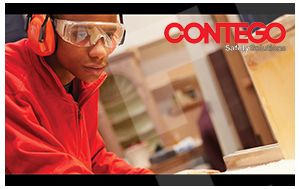Like many things in life, we often take our eyes for granted. But, according to the World Health Organisation (WHO), 39 million of us are blind. The need to protect our eyesight is imperative, especially when estimates, by charity Sightsavers, are that 80% of the world's blindness could be prevented or cured.
Health and safety legislation makes it an employers' duty to raise awareness of any risks that their work could present to an employee's health and to provide adequate and appropriate personal protective equipment (PPE). This includes managing risks to workers' eyesight.
The risks to employees' eyesight
The workplace throws up many risks to employees' eyesight, especially if that workplace is outdoors, where machinery or equipment is used, or chemicals are handled.
Agriculture or forestry workers are at risk from sharp object, debris and irritants, such as soil and sand. Construction workers face the same risks, as well as from the chemicals in various materials and the debris or danger of tools and equipment used on site. Meanwhile, those working in industrial settings face risks from the machinery and equipment they operate.
But even people working in what could be considered relatively safe environments face risks they may be unaware of. In addition to the risks they face from the sun, gardeners and landscapers face similar risks to their eyesight as those working in forestry, agriculture and construction, as well as from the chemicals in weedkillers and other sprays. Cleaning staff are similarly at risk from the chemicals in the products they use as part of their work.
Personal Protective Equipment for eyes
For some workers the provision of sunglasses may be adequate to protect their eyesight, highlighted by The Vision Council's annual National Sunglasses Day, which aims to raise awareness of the importance of protecting your eyes, from the harmful UV rays of the sun, regardless of the time of year.
The X2 safety glasses range (HG206 indoor/outdoor protection) not only protect the wearer's eyes, but feature a smart, wraparound style and the very best quality UV filtering technology to ensure optimum filtering of UVA, UVB and UVC rays.
Workers whose working environment poses risks from dust, debris, sharp objects, chemicals and other potentially harmful substances and particles, will, however, require more substantial eye protection.
Safety goggles offer protection against impact, splashes, gasses, fine dust and many other risk factors. There are anti-mist retractable eye shields so that workers always have their eye protection readily available, slim, unobtrusive, aviator-style goggles compatible with respiratory masks, those with vented frames for anti-fogging and improved comfort, sealed frames for protection against gasses and very fine dust and those shaded for protection against glare caused by welding. Polycarbonate lenses offer maximum impact resistance, while acetate lenses provide chemical and solvent resistance.
In turn, visors and face shields offer protection from thrown debris, such as the forestry visor with nylon mesh protection and the steel mesh forestry protector. And for both eyesight and noise protection team earmuffs with the Protector Zone VMC Polycarbonate Visor Kit.
How to choose eye protection
Many workplace accidents are not down to the lack of PPE provision but the unwillingness of workers to wear the protection equipment provided. There are three key factors to take into account when assessing your options for eye protection and other personal protective equipment:
#1 Fit for purpose - the PPE that you choose must be fit for purpose, otherwise there is little point in purchasing it. The items or a combination of items must provide the protection that your workers need.
#2 Quality - the better quality the PPE is the better the protection it will provide and the longer it will last.
#3 Comfort and fit -; provide your workers with comfortable, well-fitting PPE that allows them to get on with their jobs unhindered and they will wear it; if it's uncomfortable or doesn't fit properly, they won't.
Lastly find a PPE supplier who will work closely with you to understand your needs and ensure that your workforce are optimally protected.
Find out more about Contego's extensive range of personal protective equipment and exceptional customer care by downloading the Contego Catalogue and contacting our friendly team on 0800 122 3323 or sales@contegosafety.co.uk.





